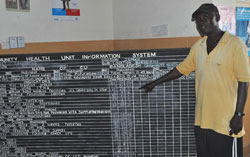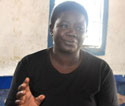Kenya - Improving Hygiene for People Living with HIV
People living with HIV face a higher risk of getting infected with diseases such as diarrhea and other common illnesses because HIV lowers the body’s ability to fight infections, so healthy water, sanitation, and hygiene (WASH) practices are especially important for them follow.
USAID’s WASHplus project is working with the Ministry of Health and community groups to promote healthy WASH practices alongside existing interventions for people with HIV and their households across Kenya.
The project is building the capacity of Kenya’s public health system in WASH-HIV integration at all levels by training health workers in an approach that encourages small doable actions, which are feasible steps that move people towards an ideal behavior.
To reach more people, the training is multi-level. First, public health officers are trained to be trainers of trainers (TOTs). More than 300 public health officials and NGO workers at the district level have been trained as TOTs. They, in turn, train community health extension workers, who then pass on WASH knowledge and skills to volunteer community health workers (CHWs).
This photo to the right is community health worker Robert Mukudi showing data on a chart at a health center to prove that more households in the Bangladesh area have adopted leaky tins for hand washing to promote better hygiene. Photo: FHI 360/George Obanyi 
Since the project started in 2010, a total of 1,500 community health workers in over 30 districts have been trained or oriented in WASH promotion. They are now educating communities on how to undertake small doable actions that use local resources to improve health and prevent diseases by promoting hand washing, making drinking water safe, improved sanitation and menstrual hygiene. The volunteer health workers promote these simple but effective WASH practices to improve conditions for people living with HIV and their families in Bangladesh, an unplanned low-income settlement in just outside Mombasa city on the Kenyan coast.
Below are some stories from community health workers on how WASH training has empowered them, and one from and HIV client who shares what she learned from her health worker.
Robert Mukudi, 40, married with seven children
Robert is in charge of 20 households. He has helped many people living with HIV who disclose their status to him after gaining his trust. 
“In my households, I pay a lot of attention to making sure there is safe water. The water we use here has impurities and I advise people to treat it by boiling or using WaterGuard,” says Robert. “I also show them how to store water well.” WaterGuard is a water treatment solution promoted through social marketing.
Robert is also the “expert” in kitchen gardening. He maintains the group’s demonstration garden and regularly tends the vegetables, usually kale or cowpeas, that the group grows in the compound of the local dispensary run by the Catholic church.
Caroline Oduor, mother of two young children
As a CHW, Caroline leads by example. She has made sure all the homes she supports have “leaky tins,” water containers that release water slowly from a small hole in the side for hand washing. 
Caroline started by hanging her first leaky tin in the compound of semi-permanent houses where she lives with eight other families. “I provided a leaky tin outside the toilet and we all take turns to fill it with water. Everyone uses their own soap. When it’s my turn, I add liquid soap in the container,” says Caroline. The soap is made by the CHWs for sale.
Caroline recalls how she assisted a fellow tenant living with HIV to maintain hygiene. “He used to mess up the toilet and bathroom, making its risky for everyone. I counseled him and encouraged him and his wife to always clean the toilet after use. The man was weak and whenever he visited the bathroom for a bath, he sat on the floor. I got him to start using a stool and his wife cleaned the bathroom well after use.”
In addition, Caroline, noted that “Three quarters of my households have leaky tins.”
Rose Makokha, community health worker
Rose and other community health workers have been promoting hand washing in schools. “The problem is that the leaky tins are stolen,” says Rose Makokha.
Everyone agrees that theft of leaky tins is a big setback to their efforts to promote hand washing. Young men steal the plastic containers and sell them as waste for recycling. 
To address the problem, the community health workers are planning a dialogue day for the community to find a solution.
“We need to help replace stolen leaky tins and continue educating the community,” says Tobias Oduori, a village elder. “We will make it compulsory for all schools to ensure they have leaky tins at all times.”
Monica, program beneficiary
Monica, a 35-year-old mother of four living with HIV, says she has benefited immensely from the advice of her community health workers. Monica lives in the Kenyan coastal town of Mombasa, where WASHplus partners are implementing activities in four districts.
“I was afraid when I found out I was HIV and my health quickly worsened,” Monica says in Swahili language. “Whenever community health worker Benta Awino visited me, I sent her away many times but she persisted.” 
Today Monica says she is grateful to Awino for helping her to improve her health. “I have benefitted from her advice on health,” she says.
The community health worker taught Monica how to avoid diarrhea and other infections. She learned how to treat drinking water and the importance of washing hands, especially after visiting the toilet and before eating or preparing food.
Monica says that she has accepted her HIV status and lives a healthier life. She and her children rarely get diarrhea.
The local public health officer, Nelly Tindell, agrees training in WASH has made a difference. “Use of toilets and water treatment at household level has reduced cases of diarrhea in the community. Cholera outbreaks that were common in the rainy season are now history,” says Nelly, and most homes now use leaky tins for hand washing where no running water exists.
The WASHplus project works with the Ministry of Health through its Community Strategy and supports community health workers to promote healthy WASH practices alongside ongoing activities for people with HIV and their households across Kenya. WASHplus is funded by USAID and managed by FHI 360. For more information contact: Evelyn Makena, emakena@fhi360.org, or visit the WASHplus website.

